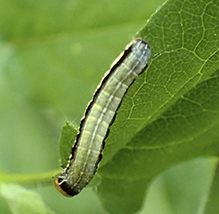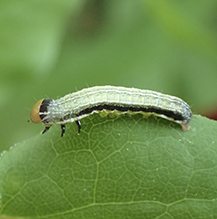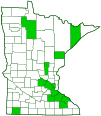lost sallow
(Eupsilia devia)
Conservation • Description • Habitat • Ecology • Distribution • Taxonomy
|
||||||||
| Hodges # | 9939 |
|||||||
Conservation Status |
||||||||
| IUCN Red List | not listed |
|||||||
| NatureServe | NNR - Unranked SNR - Unranked |
|||||||
| Minnesota | not listed |
|||||||
Description |
||
Lost sallow is an uncommon, early and late season, medium-sized moth. It occurs in the United States from New Hampshire to Pennsylvania, west to Minnesota and northern Illinois. There is a disjunct population in North Carolina, Georgia, and Tennessee, and another in western Montana and there is a single isolated record in North Dakota. It also occurs across southern Canada from Nova Scotia to British Columbia. It is uncommon throughout its range. The larvae feed mostly on aster and goldenrod, but also on cherry and oak. Adults are found in fields, prairies, meadows, marshes, and open woodlands. They are among the first Lepidoptera to emerge in the spring, they disappear before summer, and they reappear in late fall. In Minnesota, the recent adult sightings are from April to May and in October, with just one sighting in June. Adults are thick bodied, are ⅝″ to ¾″ (17 to 19 mm) in length, and they have a 1 3⁄16″ to 1 7⁄16″ (30 to 36 mm) wingspan. Moth size is sometimes given in terms of forewing length, which for this moth is 9⁄16″ to ⅝″ (14 to 16 mm). The forewings are relatively short and are squared off at the tip. The basal, median, and lower subterminal areas are brown, alternating with the remaining areas that may be grayish brown or lilac gray. The antemedial (AM) line is pale, bold, straight, and slightly angled downward. The postmedial line is pale, thin, and slightly S-shaped, curving up toward the inner margin, down in the middle, and up toward the leading edge (costal margin). The subterminal (ST) line is pale, thin, and jagged. A bold pale line, similar to the AM line and halfway between the PM and ST lines, separates the upper, grayish-brown half of the subterminal area from the lower brown half. The usual round spot (orbicular spot) in the upper median area is absent. The kidney-shaped spot (reniform spot) in the lower median area is a faint, pale, narrow, sometimes incomplete outline filled with the ground color or darker. The fringe is brown. The hindwing is slightly paler than the forewing. The terminal line and the veins are dark, and the fringe is pale. |
||
Size |
||
Total length: ⅝″ to ¾″ (17 to 19 mm) Wingspan: 1 3⁄16″ to 1 7⁄16″ (30 to 36 mm) |
||
Similar Species |
||
Habitat |
||
Fields, prairies, meadows, marshes, and open woodlands |
||
Ecology |
||
Season |
||
April to May and October |
||
Behavior |
||
Adults are active at night and will come to lights. |
||
Life Cycle |
||
|
||
Larva Food |
||
Aster, goldenrod, cherry, and oak |
||
Adult Food |
||
|
||
Distribution |
||||
|
Sources |
|||
| 12/24/2023 | ||||
Occurrence |
||||
Uncommon |
||||
Taxonomy |
|||
Order |
Lepidoptera (Butterflies and Moths) | ||
Superfamily |
Noctuoidea (Owlet Moths and Allies) | ||
Family |
Noctuidae (Cutworm Moths and Allies) | ||
Subfamily |
Noctuinae (cutworms and dart moths) | ||
Tribe |
Xylenini (swordgrasses, pinions, and xylenine sallows) | ||
| Subtribe | Xylenina | ||
Genus |
Eupsilia | ||
Synonyms |
|||
Scopelosoma devia |
|||
Common Names |
|||
lost sallow lost sallow moth |
|||
Glossary
Antemedial (AM) line
A thin line separating the basal area and the median area of the forewing of Lepidoptera.
Costal margin
The leading edge of the forewing of insects.
Orbicular spot
A circular spot or outline in the upper median area near the antemedial line on the forewing of many moths.
Postmedial (PM) line
A thin line separating the median area and the postmedial area of the forewing of Lepidoptera.
Reniform spot
A kidney-shaped spot or outline in the lower median area near the PM line on the forewing of many moths.
Visitor Photos |
|||||
Share your photo of this insect. |
|||||
| This button not working for you? Simply email us at info@MinnesotaSeasons.com. Attach one or more photos and, if you like, a caption. |
|||||
Babette Kis |
|||||
Eupsilia devia (lost sallow) Eupsilia devia, lost sallow, caterpillar on aster species leaf, Barnes Prairie near the hedgerow, Racine Co., WI. Photos were taken on June 7, 2023. |
 |
||||
 |
|||||
MinnesotaSeasons.com Photos |
|||||
|
|||||

Slideshows |
||

Visitor Videos |
|||
Share your video of this insect. |
|||
| This button not working for you? Simply email us at info@MinnesotaSeasons.com. Attach a video, a YouTube link, or a cloud storage link. |
|||
Other Videos |
|||


Created: 12/24/2023
Last Updated:

